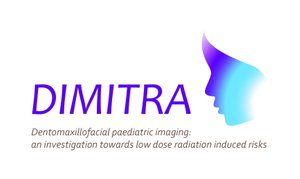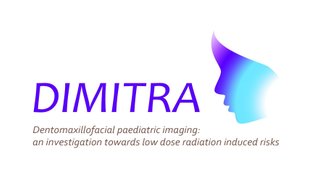DIMITRA
Dentomaxillofacial paediatric imaging: an investigation towards low dose radiation induced risks
Cone Beam Computed Tomography (CBCT) is an emerging X‐ray technology that has found wide applications in dentomaxillofacial imaging. The ability to provide high‐resolution 3D images has resulted in a significant increase in the volume of dental radiology procedures. Although CBCT is associated with higher radiation risk to the patient than conventional dental X-ray imaging (intraoral or panoramic), it is considered to be ‘low dose’ imaging as defined by the High Level Expert Group (HLEG; www.hleg.de) with doses ranging from a few μSv to 1 mSv per examination. This proposal is set to tackle important issues raised by the HLEG and the MELODI (Multidisciplinary European Low Dose Initiative) platform. In particular, as deduced by the name DIMITRA (Dentomaxillofacial paediatric imaging: an investigation towards low dose radiation induced risks), the project focuses on the uncertainties associated with radiation‐induced health risks at low doses in paediatric dentistry and is a multidisciplinary effort to approach the involved risks from different yet interrelated perspectives: radiobiological characterisation, dosimetric quantification, epidemiological surveying and image quality & dose optimization. A unique Monte Carlo (MC) framework will be used to accurately calculate organ doses in dental CBCT imaging, to quantify the radiation induced risk and to feed the radiobiology team with the appropriate data towards the identification, development and validation of biomarkers for radiation induced health effects. Furthermore, it will constitute the basis upon setting up a gender- and age-related epidemiology study. The balance between image quality and dose levels will be explored aiming at reducing the risk through image quality optimization. It is expected that DIMITRA`s outcomes and deliverables will lead to further recommendations and potential future adaptations for the use of CBCT in paediatric dentistry.
WORK IN PROGRESS
This project focuses on the uncertainties associated with radiation-induced health risks at low doses in paediatric dentistry. It is a multidisciplinary effort to approach the involved risks through four different yet interrelated tasks: radiobiological characterization, dosimetric quantification, epidemiological surveying and image quality & dose optimization.
PARTNERS
- Katholieke Universiteit Leuven - Belgium
- Université Paris Descartes Sorbonne-Paris Cité - France
- Belgian Nuclear Research Centre SCK•CEN - Belgium
- Iuliu Hatieganu University of Medicine and Pharmacy - Romania
PROJECT
Open Project for the European Radiation Research Area
GRANT AGREEMENT NUMBER
604984
DURATION
48 months
START
01/06/2014
CONTACT
reinhilde.jacobs@kuleuven.be


